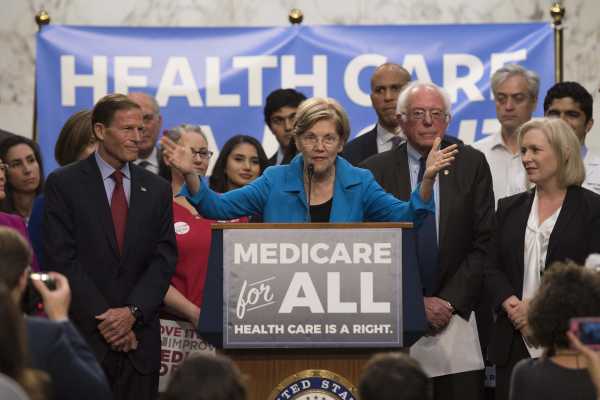
The next presidential election may still be two years away, but progressive activists are already trying to get potential 2020 Democratic contenders on the record about key priorities on the left, from defunding US Immigration and Customs Enforcement (ICE) to reforming Wall Street.
Familiar names being talked about for 2020 — Sens. Bernie Sanders, Elizabeth Warren, Kirsten Gillibrand, Kamala Harris, and Cory Booker — headlined the We the People summit in Washington, DC, this week. As these senators mull challenges to President Donald Trump in two years’ time, activists and labor leaders plan to aggressively question their voting records and get them to outline their vision for the future.
“The people on the ground are saying it’s not enough to run against Trump,” said Jennifer Epps-Addison, co-executive director of the Center for Popular Democracy, one of the main sponsors of the summit. Epps-Addison said she believes that strategy will lose Democrats elections.
At Wednesday’s summit, activists focused their questions on Wall Street regulation and taxation, climate and renewable energy jobs, protecting women’s reproductive health and immigrant rights, and getting money out of politics.
“These are not softball questions; that’s the tone we want to set,” Epps-Addison said. “At every forum and every Fourth of July parade, we’re going to make sure the hard questions are going to be asked.”
Sen. Cory Booker was asked about his previously cozy relationship with Wall Street
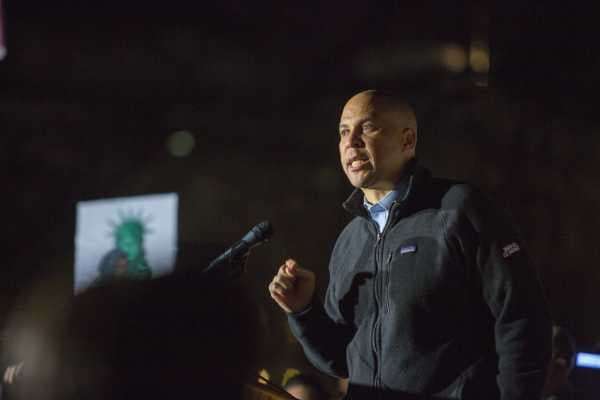
Booker’s first question hit on a controversial issue: Wall Street reform. It was a key question for the New Jersey senator, who made headlines for receiving $1.87 million from Wall Street in 2014.
Booker had tough words for Wall Street on Wednesday, calling for “a raft of reforms,” including ending a “carried interest” loophole for hedge funds that he estimated would put $50 billion worth of revenue back into the US budget.
“Where are we right now in America?” he said. “We’re at an 85-year corporate profit high and a 65-year low, as a percentage of all of our GDP, of worker pay. And so this has got to end. And I believe the way do it is by putting commonsense regulations in place.”
Booker also received a question on what he would do to protect health care and improve access to mental health care and drug addiction treatment.
“Health care is a right, health care is a right, health care is a right,” he said. “If people are denied health care, people die. There’s too much of a stigma in this country in understanding that mental health and physical health, it’s the same thing.”
Last year, progressives were angered by Booker’s vote last against an amendment allowing Americans to buy prescriptions from Canada. Booker voted against the amendment over safety concerns, but later partnered with Bernie Sanders on a similar measure allowing prescription drugs to be imported from Canada, saying the new bill had the right safety measures in place.
Still, his original vote against the amendment earned him backlash, given the fact he had received more than $200,000 from the pharmaceutical industry in 2013 and 2014 (Booker represents a state that’s home to some large pharmaceutical companies). He’s since stopped taking contributions from pharmaceutical companies after public criticism.
Sen. Elizabeth Warren floats the Democratic version of “drain the swamp”
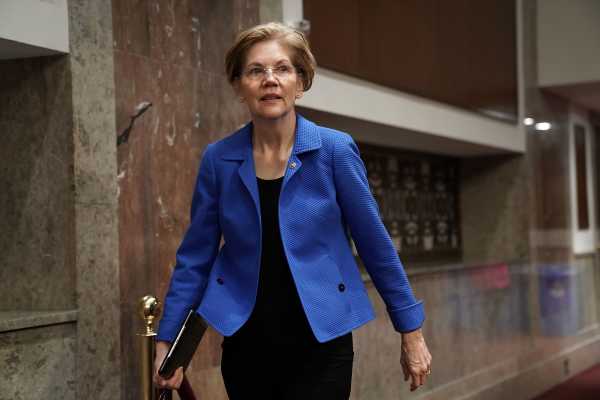
Elizabeth Warren is another 2020 name who already carries a lot of clout with progressive groups. Her role proposing and setting up the Consumer Financial Protection Agency to police banks after the 2008 financial crisis and her take-no-prisoners attitude toward corporations has won her a lot of fans among the Democratic base.
That was on full display on Wednesday. Demos Action president Heather McGhee introduced Warren as “the cop on the beat” of Wall Street after 2008. Warren took the stage and debuted her own version of the ubiquitous Trump phrase “drain the swamp.”
“We’re going to clean up this place; we’re going to hose out this cesspool of corruption,” she said, to cheers from the crowd.
Even with recent jobs reports showing 3.8 percent unemployment, Warren made it clear she didn’t care about a good economy unless it was good for American workers.
“I have one measure for how the economy is doing — how are working families doing?” Warren said. “Our government has been captured by powerful corporations and billionaires who have managed to rig our economy so it works for them and not for you.”
Activists questioned Warren on the issue of mass incarceration, which she called “a national embarrassment,” and whether she would support strengthening labor unions. The second question was easy for Warren, who recalled a personal story of her mother working a minimum wage job to support a family of three.
“It was at a time in America when a minimum wage job would support a family of three and you could make a mortgage payment,” Warren said. “There was a time in America where we supported unions here in Washington. You count me in. I believe in unions.”
The big questions for Sen. Bernie Sanders were about race and immigration
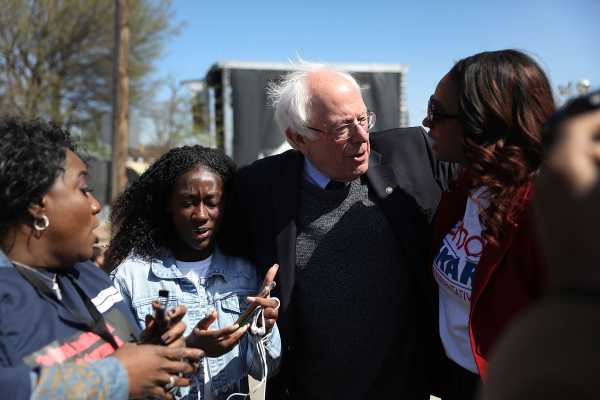
It was hard to tell who received the loudest standing ovation on Wednesday, but Bernie Sanders was the only senator who had audience members chanting his name.
Sanders is in somewhat of a tricky position heading into 2020; he was the unabashedly progressive candidate for president in 2016, running on a slate of ideas including single-payer health care and tuition-free public college.
“Many of the ideas we talked about were thought to be fringe ideas,” he told the audience. Because of your efforts, those ideas are thought to be mainstream ideas.”
But in 2020, Sanders is no longer the standout progressive voice; many of his fellow senators have signed on to his Medicare-for-all bill and are embracing other policy initiatives like a $15 minimum wage and overturning Citizens United. Sanders’s policies have already won, but Sanders himself could face a much tougher road ahead in 2020.
Activists asked Sanders about fighting against institutional racism and overturning Citizens United. They also asked him where he stood on defunding ICE.
“You know why I voted against the budget that I helped write? Because it did not include any provisions to provide legal status to the young people [of DACA],” Sanders said. “I consider the issue of 1.8 million young people who know the United States as their only country and who are facing deportation as perhaps the great moral issue facing this country today.”
Sen. Kirsten Gillibrand promised to support an obscure Wall Street tax
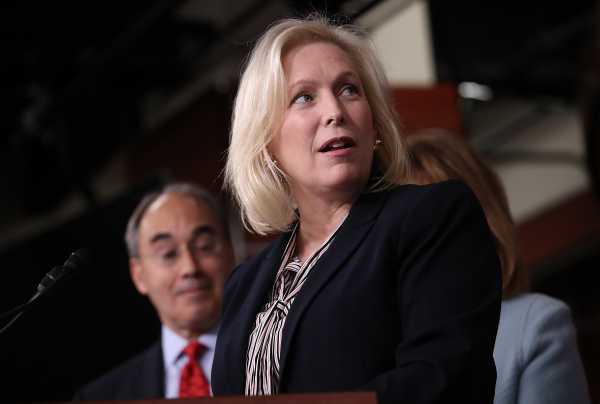
Kirsten Gillibrand has made a name for herself fighting to end sexual assault in the military and sexual harassment in the workplace, boosting equal pay, and supporting undocumented immigrants.
Still, she has a lot to prove to progressive groups if she wants to be successful in 2020, especially when it comes to her past. The New York senator has a mixed record: She used to hold more conservative stances on guns and giving undocumented immigrants amnesty. And there have been questions about her Wall Street donations.
But Gillibrand has moved left over the years, and on Wednesday, liberal activists believed they got another promise out of her to support an obscure Wall Street tax called the “financial transactions tax,” which is a 0.03 percent tax on every single Wall Street transaction. She said she would support it when asked by an Indivisible activist from New York.
“I think income inequality is the greatest risk we have to our democracy right now because it is impacting everything,” she said. “In this economy today, we reward ownership, we don’t reward work. In this economy today, we give more voice to the privileged and the wealthy, in the way campaigns are run, in the way lobbying takes place, in the way Washington works, than we do everyday people.”
Gillibrand said that in the past year, she’s spent “a lot more time” listening to everyday Americans.
“To address income inequality, you really need to take out the corporate structure,” she added, talking about stopping companies from sending jobs overseas, giving so many profits to shareholders, and investing back in workers.
Sen. Kamala Harris was questioned about her environmental record
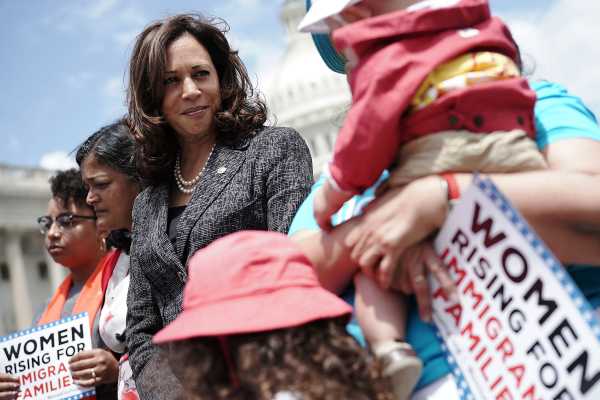
Kamala Harris has been perhaps the most outspoken senator on the issue of immigration. Last year, she was the first senator to publicly withhold her vote for any government funding bill that did not address the plight of 700,000 DREAMers in limbo after President Trump abruptly cut the program.
So the California senator has plenty of allies with immigrant rights groups — but that’s not what activists wanted to question her on at the summit. The first question directed at Harris was about the environment and renewable energy, and she pointed to her experience as California’s attorney general.
“I care about this issue, not because I have a particular desire to hug a tree but I have a strong desire to hug a healthy baby,” she said, saying that it’s important for progressive states like her home state of California to fight against the Trump administration’s attempts to roll back environmental regulations.
Harris also received questions about protecting women’s reproductive rights and healing the racial divide in minority communities facing heavy policing.
“Racism is real, and we’ve got to deal with it in a number of ways as it relates to law enforcement,” Harris said. “We need to have robust pattern and practice investigations in a DOJ that understands the only way that justice for all of us will occur is when there is justice for all of us.”
Correction: Sen. Cory Booker voted against a 2017 amendment that would have allowed Americans to buy prescriptions from Canada. An earlier version of this story referred to it as a “bill.”
Sourse: vox.com






